On the second day of November 1944, in the middle of France, a grandfather sat down to write the story of the day an American soldier died in his village.
It had been a day of wonder and sorrow, wrote Monsieur Colombier. The Germans vanquished! The French flags waving! Happy GIs tossing chewing gum and chocolate bars to joyous children. Strangers kissing on the cobblestone streets.
“The huge hope of liberty and better life cheered the hearts,” he wrote. “We forgot the bombing despite the planes circling above our heads.”
The occupying Germans had used the village of Grez-sur-Loing as their personal pantry during World War II, filling their stomachs with the bounty from farmers’ fields, and eggs and chickens from their flocks. When they heard the Allies were near that August day, they blew the bridge connecting the town to its neighbors.
But the Americans were not deterred.
Townspeople offered their own row boats to ferry soldiers over so they could root out any remaining Germans.
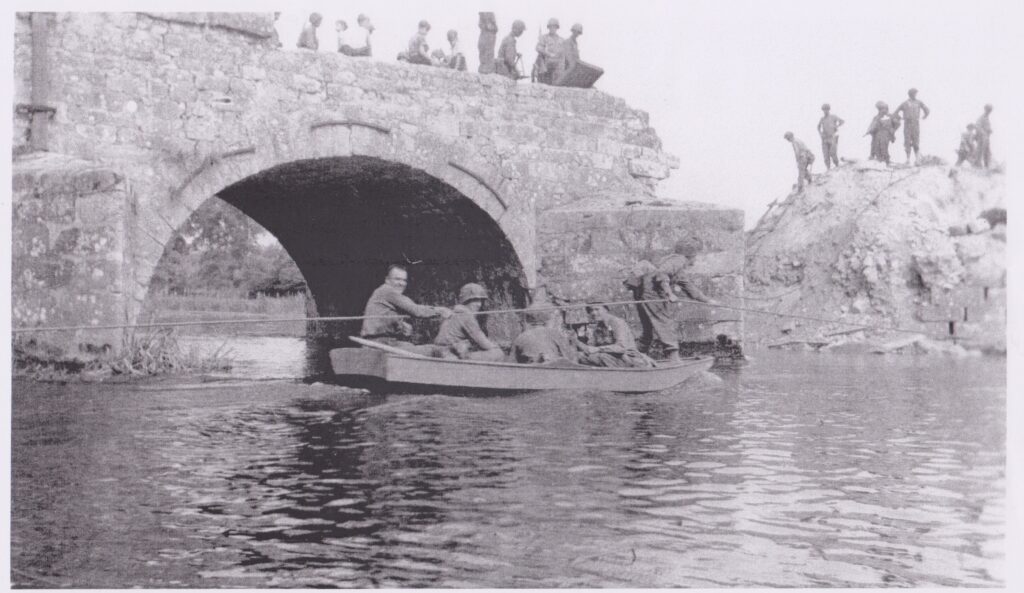
One overcrowded craft – too many soldiers, too much gear – was gliding toward the village when it capsized.
Six soldiers swam for shore, Colombier wrote. Two more were quickly rescued. The last was lost in the deep water. He was found floating in the weeds after a frantic search.
“They did not expect from one bank to the other, one would not make it,” the Frenchman wrote. “His comrades protected him with a cover and deposed him with his military equipment next to the bridge.”
In the hours that followed, the villagers came, one after another, and covered the body of the farm boy from Nebraska with flowers.
***
The soldier who died that August, far across the Atlantic, left his parents and his brothers and his young widow, pregnant with their first – and now only – child, to mourn.
The telegram had been brief: We are sorry to inform you that Private William Roy Walters has been killed in action in France.
That was all. The Second World War would swallow 405,000 American soldiers, an ocean of young lives. It would be years before Pvt. Walters’ body came home to be buried in the Weeping Water cemetery.
And it would be decades, late in the summer of 2024, before his only child, the baby girl who arrived with the dawn of 1945, would learn what became of the father she knew only through a pair of photographs.
In all those years, she would never imagine leaving her own small Nebraska town and flying across seven time zones to visit the place her father died.
“It was overwhelming,” Gerri Eisenhauer-Larson said. “Three weeks and we were on a plane. I went from knowing nothing to finding out everything.”
Geraldine Walters had grown up wondering what had become of her father. How had he died? Who was at his side?
Her mother remarried. He was a World War II veteran, too, and a good man. Gerri called him Dad.
He’d held her in his arms when the train came, bearing her father’s coffin.
She was probably 5, she says. She has a memory of the flag and the 21-gun salute.
“I buried my head in his shoulder. It was years before I could attend another military funeral.”
Her mother didn’t talk about her teenage sweetheart, the 20-year-old soon-to-be father, a country kid who never learned to swim.
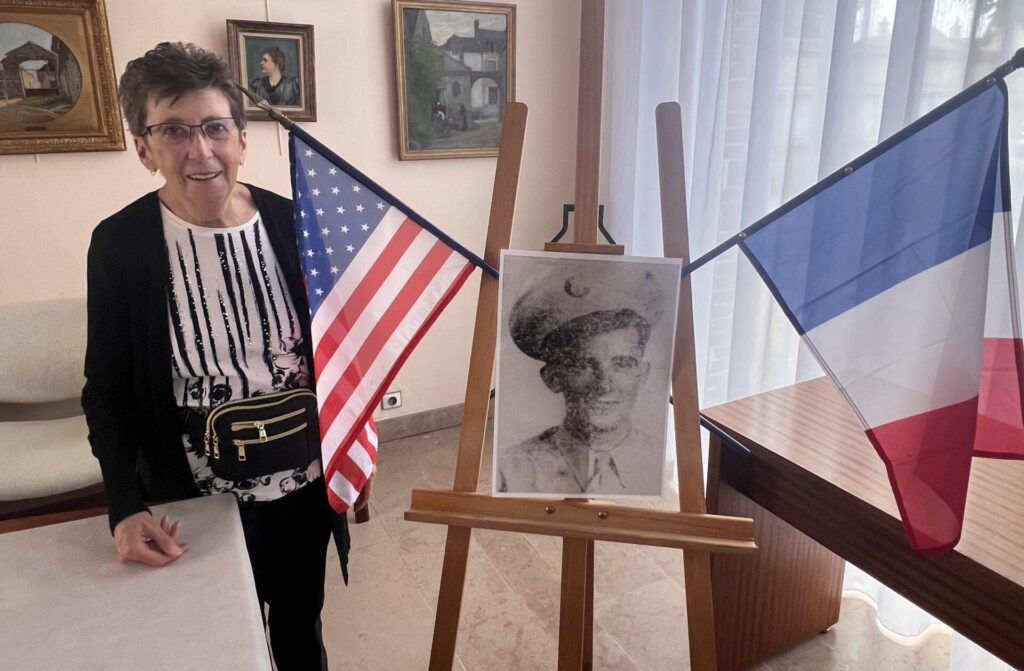
But growing up, Gerri had small glimpses into William Walters’ world. She got to know his four brothers. She spent holidays at his parents’ farm. But there were no photos of their dead son on the mantle. No stories.
“There was no grief talk. And I was of that age; I wasn’t going to bring it up.”
She married young and settled on an Otoe County farm with her husband, Jim Eisenhauer. They raised a son, Allen, and a daughter, Jan, who also wondered about the ghost of a grandfather they never knew. Did he suffer? Was he alone?
“So many unanswered questions,” Jan Moore says. “We always wished for her that we could get an answer. We just knew it was a missing link.”
The family wrote to the Department of Defense, only to discover a 1973 fire in St. Louis had destroyed thousands of military records, including those of Pvt. Walters.
They poked around on the internet. Allen tracked down the names of soldiers in his grandfather’s unit and found one from Nebraska. Maybe he still had relatives in the area?
“I tried my hardest to find his family,” he said. “After so long, you’ve run out of options.”
Gerri had her dad’s Purple Heart and two photos: the private in his dress uniform; and her parents posing next to a stand of hollyhocks – a skinny guy with his hip cocked and shirt sleeve rolled, arm around his girl Maxine, both of them grinning.
There was a single letter: How’s Maxine doing? I made it across the pond. It’s OK, but I wish I was on the other side…
Gerri became a grandmother. Her first husband died and she married again. She retired from work in the Syracuse schools and home health care. She took care of her second husband when his health began to fail.
And then late this summer, her phone rang. It was the mortician from the Syracuse funeral home, the man who had taken care of her first husband’s funeral in 2008. A message had come in. Seemed strange, he said, but he thought he should pass it along.
“My name is Christophe and I am from a small village in France,” the email began. “We have recently found information that a Private William Walters was killed while liberating the village of Grez-sur-Loing. We are looking for any of his family.”
And William Walters’ 79-year-old daughter wrote back: He is my father!!!!!
***
It had become his mission, finding the family of the soldier who’d slipped under the water that happy liberation day.
Christophe Ligere has lived in Grez for more than 20 years, fascinated by the history of his adopted 12th century village, the Frenchman wrote last week, his long emails translated from French to English.
The father of two is a project manager for a nuclear power company, a village official and a member of the local history association, put in charge of the commemoration of the 80th anniversary of the town’s liberation.
When he began his research last winter, he stumbled upon the memoir of Monsieur Colombier, whose forgotten story had transposed the first and last names of the drowned GI.
It was a start. Now where to find him? Christophe uncovered old photographs of Army Jeeps that identified the troops as from the 10th Infantry; 5th Division. From there, a list of soldiers and one name that came close. Not Walter Williams but William Walters.
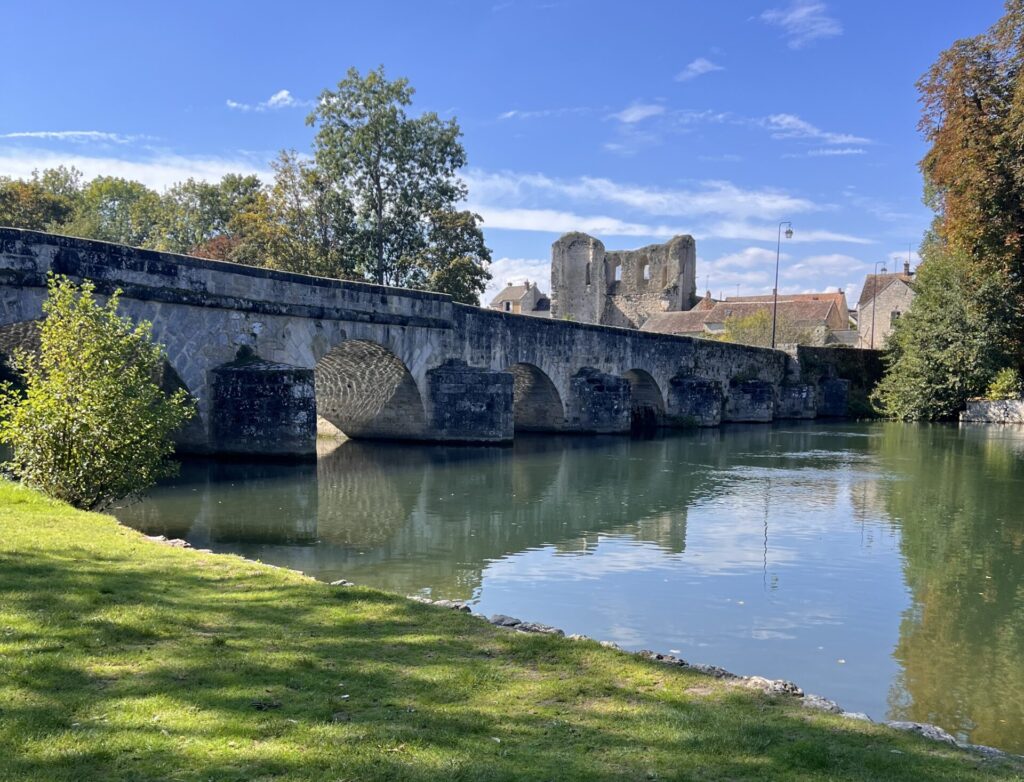
“That was my first victory.”
A genealogy site revealed more: Pvt. Walters had a child. A daughter, born after his death. Geraldine Elaine Walters had married a man named Eisenhauer. They lived in a place called Syracuse, Nebraska. He found the city hall and sent an email. No answer. He found a funeral home.
He pecked out the same message, translated it to English and clicked send.
Two days later, he was sitting at his kitchen table with his morning coffee when he opened the reply: My name is Geraldine Walters Eisenhauer Larson. I live in Syracuse, Nebraska. Thank you very much for passing on this information about my father … I only knew that he died somewhere in France. He died on August 23, 1944 and I was born on January 2, 1945.
Tears filled the Frenchman’s eyes.
“I almost fell out of my chair, I couldn’t believe it. I found the soldier’s daughter almost to the day, 80 years later.”
But that was only the beginning.
***
Jan read the email Christophe had sent the funeral home. After so many decades, an answer to their questions. What could be better?
She looked closer and found out. The email contained an attachment, a flier for a celebration of the town’s liberation on Sept. 21 and 22. And there was more: HOMMAGE AU G.I. PVT William Roy Walters.
“I don’t know French, but I know what homage means,” she said.
They weren’t just celebrating the liberation. They were honoring her grandfather.
“I called Jan and I said, ‘We have to go,’” Allen said.
Jan had already picked up the phone: Mom! We have to go!
They’d book flights to Paris and take the train to the village, an hour south of the Eiffel Tower. Jan had a passport. But the ceremony was less than a month away and her mom and brother had never been out of the states.
Two days later, they were at the passport office in Lincoln. They had 23 days. Could they rush? They waited. Christophe called the U.S. Embassy in France and explained the dilemma. They were sympathique.
The passports arrived in time.
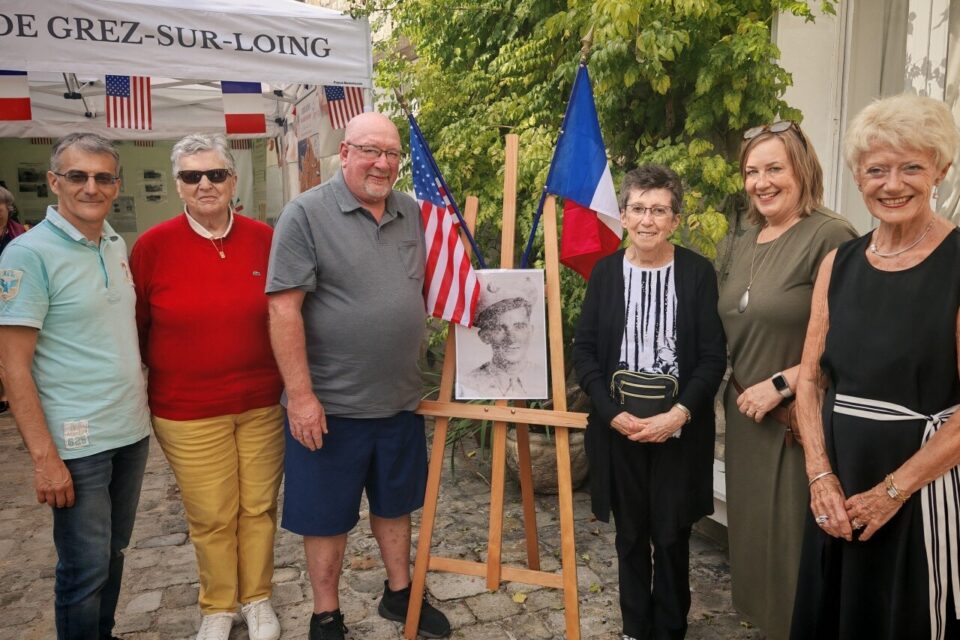
The plane carrying the curious family arrived in Paris and a driver whisked them to their hotel. They boarded a train for the short ride to Grez-sur-Loing the next morning.
“It was just like in the movies,” Jan said. “The train pulled away and there was one man standing on the other side of the tracks waiting for us.”
Christophe, the amateur historian and detective – their hero – there to welcome them.
The Frenchman saw their faces.
“Already, they felt like friends.”
***
The Nebraskans were feted by their hosts. Wine and cheese and duck, and more wine. “Lots of wine,” said Allen.
They loved the fairytale village with its castle ruins, cobblestone streets, the arched stone bridge over the placid Loing River, half the width of a football field.
They were guests of honor at a ceremony in the town hall, listening to the words from the diary of Monsieur Colombier from 1944: I thought of this poor soldier marked by fatality, taking from him the glory and from what he had left behind …
Gerri accepted a key to the city, was interviewed by a Paris TV station and stood on the green grass where her father’s body rested on liberation day. An old man stood next to her.
Marc Perrot had black-and-white photos of his father’s row boat, the boat that capsized. He’s in one of the photos, a little boy in his father’s arms. He handed her a letter: Dear Madam, I was 13 years old at the time, but I will never forget this dramatic incident … We will not forget your father and all the American soldiers who came in France to restore freedom.
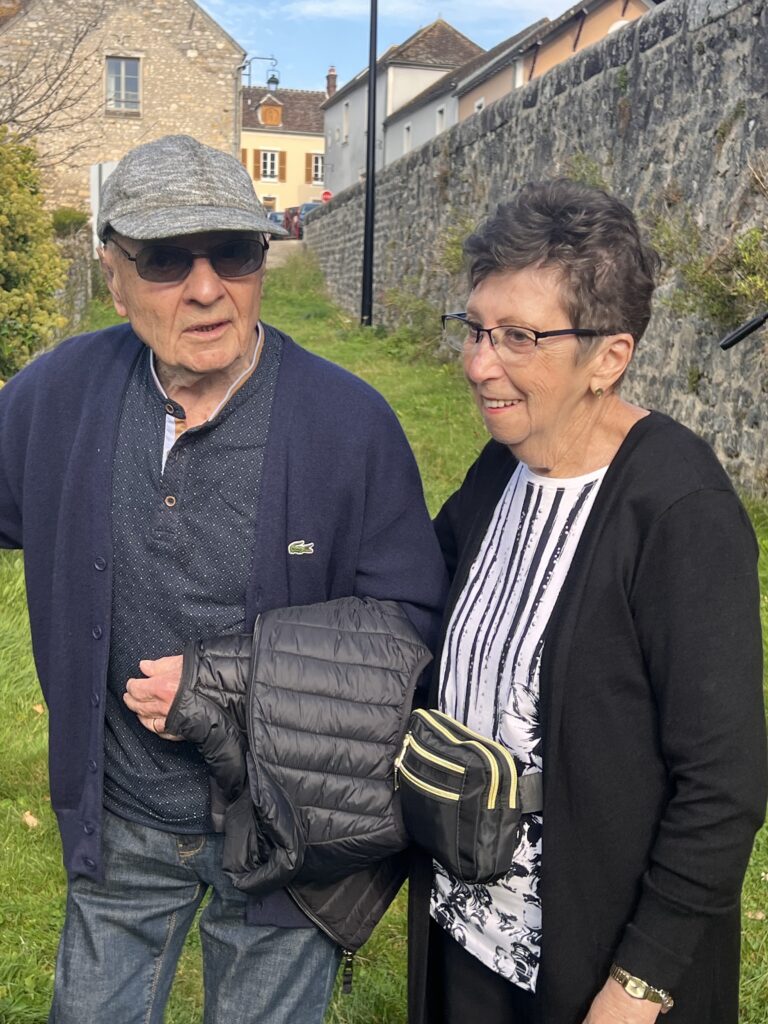
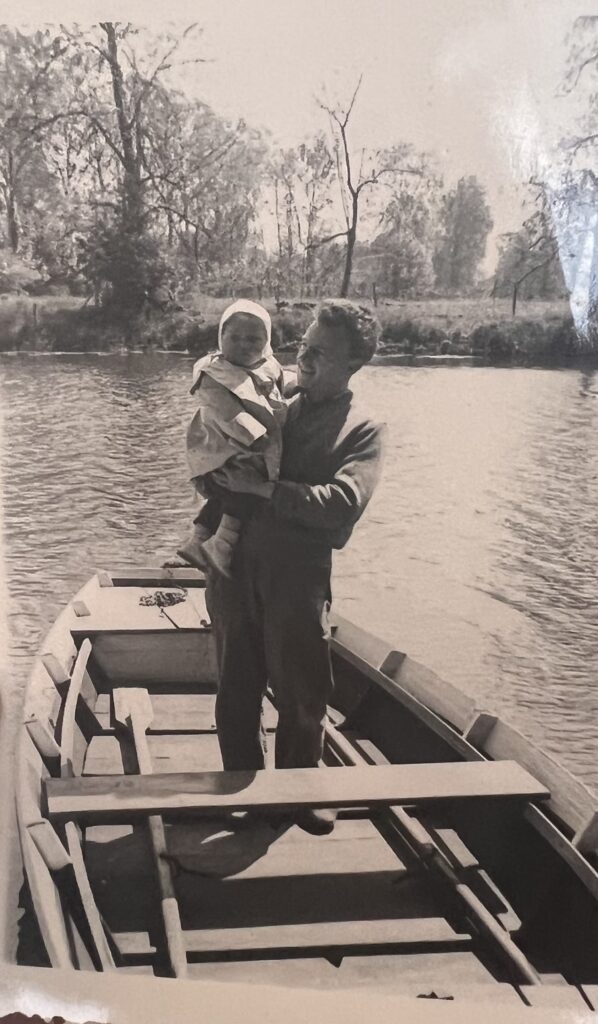
The river was placid and peaceful, Allen said, still as a lake. It was hard to imagine someone drowning there. But they learned the surface hid a strong current. The vegetation that snared the body of Pvt. Walters had taken countless others attempting to swim across.
For three days, the family soaked it all in. Christophe drove them through the green countryside past the endless rows of white crosses. They rode in a restored World War II Army Jeep. Visited the church where the town held a memorial the Sunday after the drowning, candles lit for the American GI whose body had been taken away.
And then it was over, and they were rewinding their journey, home, back to their jobs and lives, still marveling.
So much had to come together to make it happen.
The puzzle of the mismatched name that Christophe pieced together. The odd email the mortician could have easily deleted. The attachment Jan decided to open. The old man who witnessed the drowning and returned to Grez to greet the family.
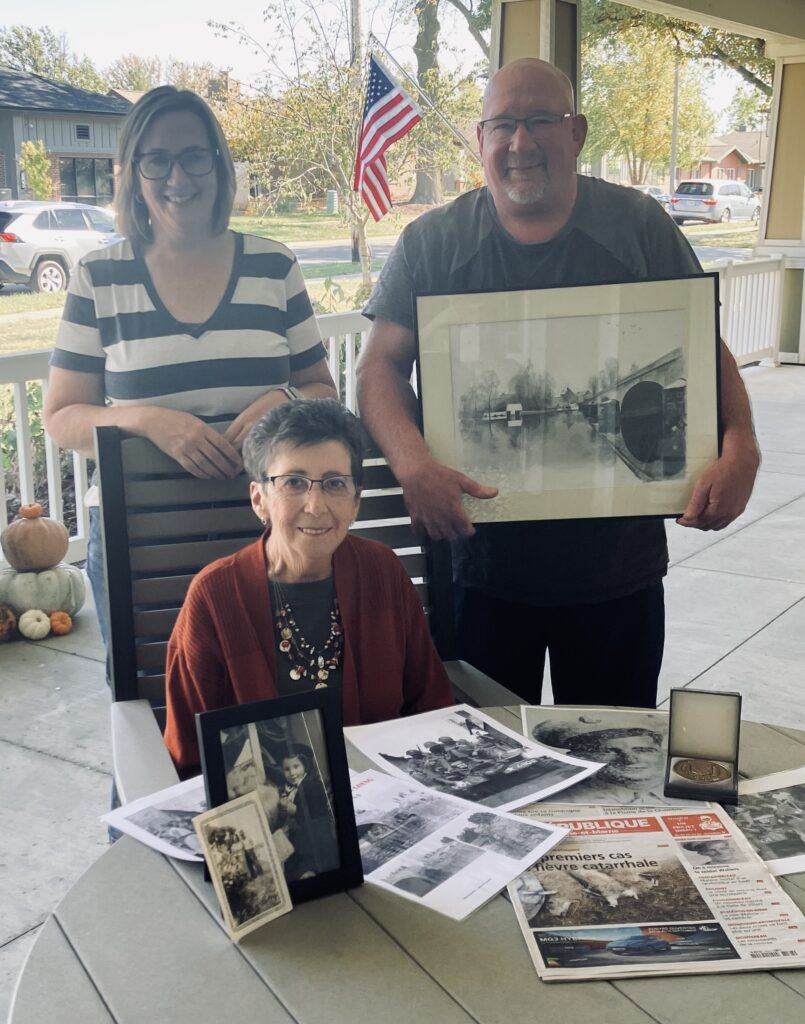
“There was a real peace,” Gerri says. “Just knowing what happened to him, and how they cared for him.”
And how they cared for his family, 80 years later. The generosity of a French village in a country where more than a half-million soldiers and civilians and resistance members lost their lives.
“It is genuine gratitude they have,” Jan says. “We have no idea how it would feel to have our little towns taken over like they did.”
Next year, the town of Grez-sur-Loing will name a street after Pvt. William Walters. There will be a memorial in the park, sharing his story with the next generation.
Christophe plans to visit Nebraska in the spring. He’d like to reunite with his new friends, and tour the places Walters lived with his parents and brothers – Elmwood and Plattsmouth and Nehawka.
And visit the Weeping Water cemetery, where every Memorial Day, year after year and decade after decade, Gerri would stand at her father’s grave, on the edge of a little town in the middle of America.
“I would just think of those questions that never were answered.”

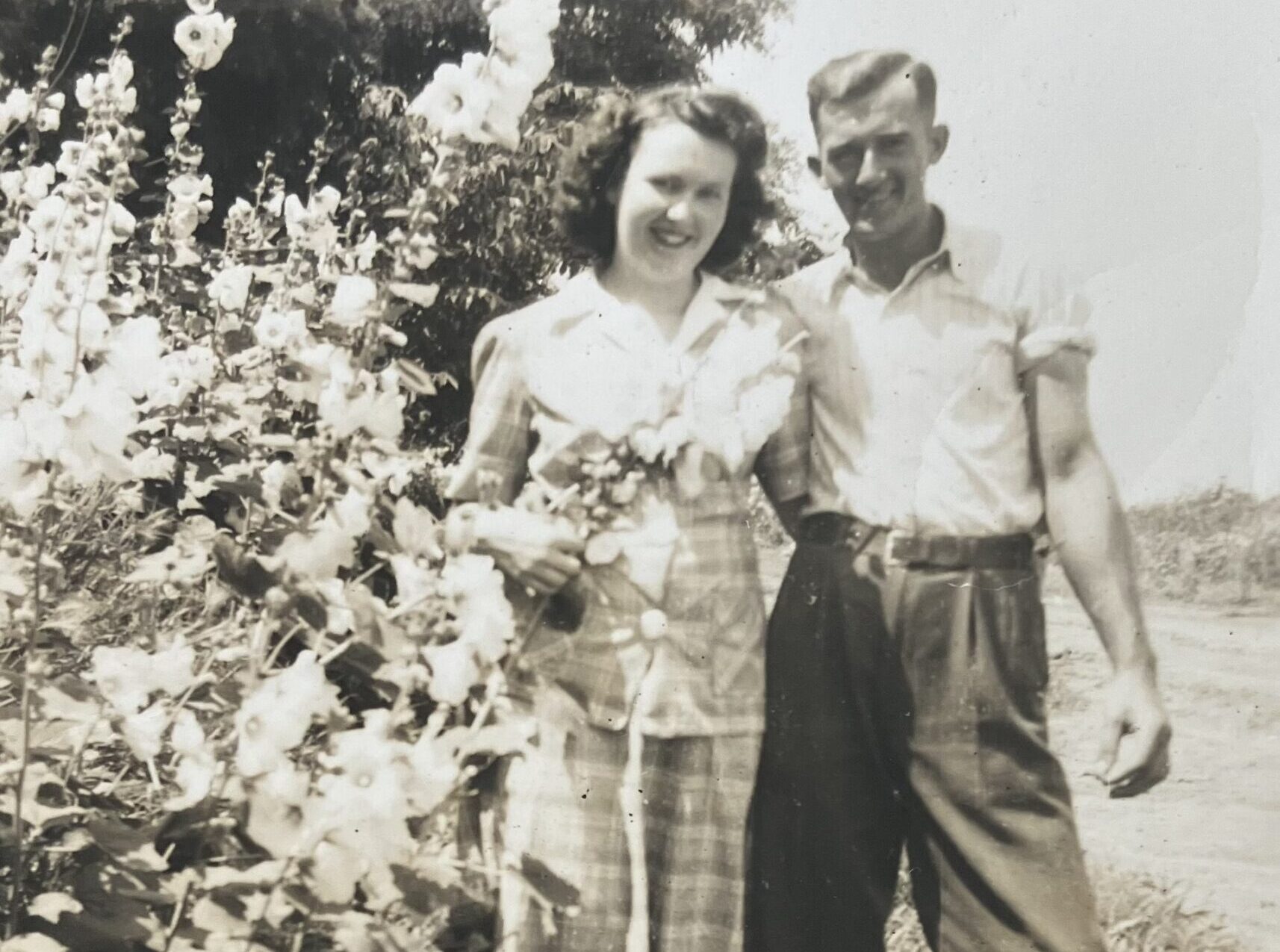

24 Comments
That was a beautiful story. It brought tears to my eyes. I’m 94 and remember the wartime fully. My brother was serving in the war at that time. So blessed for this family. Thank you.
Such a touching story. Thank you.
Moving
This is a very entertaining and interesting article about some individuals who persevered because it was an important event to them. I love history and this inquiry into the life and death of a young man is part of WWII. It is very uplifting to know this town in France will hold a ceremony and name a street after him. He will not be forgotten in France and in Nebraska.
Wonderful story! Beautifully told! Many thanks.
Excellent story! I’ve always loved to read your articles in the Lincoln Journal. I feel as if I were there watching as this unfolded. Thank you, from a daughter of a WWII Veteran. They were the greatest generation.
Cindy, absolutely a fabulous article only you could do. Miss not seeing the old spinning crowd.
What a beautifully written story. I am blubbering like a baby. Great writers tie the emotion to historical events and make them live to the reader. I felt I was with that family and my heart aches for them and their loss. I also am thankful always for the sacrifices of our servicemen and women and also for who aide our troops, even after death. Thank you for this story.
I am so happy that Cindy is still writing! For years – dating from 1993 – when I opened my first business in Lincoln, she was a good customer and I looked for her byline every day in the Lincoln Journal-Star. I am now retired and read the LJS online. Thanks for featuring her!
Excellent story. So many living in the United States today cannot understand the tyranny of World War II and do not realize the appreciation of those who lived through that tyranny have for the U.S. soldiers who fought and died for them.
Beautiful story…tears. thank you , Cindy..I think you are a Fremont High graduate? I was a journalism student under Sharon Kaiser, a FHS ’71 grad.
Lovely story, Cindy.
Cindy, Thank you for your accounting of this soldier and his family
So very beautiful. You made it real for all of us. Thanks, Cindy.
I’m so happy to again start a day with your sensitive writing. Keep on!
Wonderful story. My interest lies both with this family and the Eisenhauser name. My maiden name is Isenhour. My father (Eugene Isenhour) and his three brothers all served at various places during WW2. The youngest (Robert Isenhour) landed on Normandy and was wounded. All 4 brothers made it home to North Carolina safely with various wounds.
What a great story! Thanks for telling it so well
What a lovely, lovely story. Thank you Cindy for writing it, Gerri and family for sharing it and Flatwater Free Press for publishing it.
A beautiful story! Mssr. Christophe is a hero, too, and finding the young soldier’s daughter and family is a great accomplishment! So happy for everyone!
Lovely story Cindy. I miss your stories!
Cindy, a wonderful article. It brought me to tears. I hope you are doing well. You did an article on me years ago. “Muffin Man”. I found the record at the Thrift Store in Auburn of me singing when I was 4 years old..
Our family came through Ellis Island. We have the certificate showing the Walters arrival in New York. Some of our ancestors stayed the East Coast and The mid-West and some traveled to South America (Peru). We’ve always been a military family, with several teachers, regardless of where our family had settled down. My brother, Air Force Sergeant Erich Walters has Pvt Walters ears and nose. My public service career began at the Presidio of San Francisco, U.S. Sixth Army Division, January 22, 1981. Best job and time ever. We would like to confirm our connection. Feel free to pass on my contact information, please.
Thank you so much for writing this wonderful story about Pvt. William Walter’s. I cried reading how wonderful it was his daughter found out about her dad and the impact his death had on the French village.
I had just watched the story on CBS Sunday Morning and googled more information about the story when I came upon your story about him. I was spellbound as my uncle Pvt. Adam Dicesore was killed in France on August 24, 1944, one day after Pvt. Walter’s and I knew he was killed not far from this area. I wanted to see if there was a connection with my uncle but I found they were in different divisions. My uncle was in the 11th Div. 5th Infantry and I was able to see that Pvt. Walter’s was in the 10th div. I, too, had written to the Army hoping to find more information about my uncle’s death and received a letter back stating that the fire had destroyed the records. After reading your story, it gives me hope that if I visit the town and the cemetery of Villeneuve-Sur-Auvers where my uncle was temporarily buried, and there is a memorial to the American soldiers, that I may find out more about what happened to my uncle Adam who my son is named after!
Wonderful story; well written and heartwarming. I also commented on your story about Hiram Scott College graduate. Coming out of New Jersey; graduating from Hiram Scott College in 1971. Played Quarterback and brother Joe, offensive tackle for 3 years. Coach Dick Beechner, recently celebrating his 90th birthday, Hiram Scott’s only coach for 6 years of its’ existence ironically lives now in Kearney, Nebrask as I do. Dick came here as Athletic Director for Univ. Neb. @ Kearney in 1987. Dick was very successful with his football teams including a 7-3 victory over Boise State in 1970 our final year.